|
|
|
Sort Order |
|
|
|
Items / Page
|
|
|
|
|
|
|
| Srl | Item |
| 1 |
ID:
191904
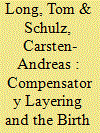

|
|
|
|
|
| Summary/Abstract |
International organizations come in many shapes and sizes. Within this institutional gamut, the multipurpose multilateral intergovernmental organization (MMIGO) plays a central role. This institutional form is often traced to the creation of the League of Nations, but in fact the first MMIGO emerged in the Western Hemisphere at the close of the nineteenth century. Originally modeled on a single-issue European public international union, the Commercial Bureau of the American Republics evolved into the multipurpose, multilateral Pan American Union (PAU). Contrary to prominent explanations of institutional genesis, the PAU's design did not result from functional needs nor from the blueprints of a hegemonic power. Advancing a recent synthesis between historical and rational institutionalism, we argue that the first MMIGO arose through a process of compensatory layering: a mechanism whereby a sequence of bargains over control and scope leads to gradual but transformative institutional change. We expect compensatory layering to occur when an organization is focal, power asymmetries among members of that organization are large, and preferences over institutional design diverge. Our empirical and theoretical contributions demonstrate the value a more global international relations (IR) perspective can bring to the study of institutional design. international relations (IR) scholars have long noted that international organizations provide smaller states with voice opportunities; our account suggests those spaces may be of smaller states’ own making.
|
|
|
|
|
|
|
|
|
|
|
|
|
|
|
|
| 2 |
ID:
191909
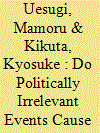

|
|
|
|
|
| Summary/Abstract |
We examine whether politically irrelevant events can cause conflicts, by analyzing the effects of professional football games in Europe on protests in Africa—an unintended spillover across the continents. By expanding psychological theories, we argue that the outcomes of the football games in Europe can affect African people's subjective evaluation of domestic politicians, which in turn can trigger protests. By exploiting as-if random variation in the results of 15,102 close football games conditional on betting odds, we find that compared to draw games, close losses of African players’ teams increase peaceful protests in their original countries while not changing the likelihood of riots or armed conflicts. The effect is particularly large for non-ethnic protests targeted at a central government. Close losses also temporarily decrease people's trust in their country's leader. By contrast, close victories do not have equivalent or compensating effects on protests or public opinion. These results suggest asymmetric misattribution: people in Africa unreasonably blame domestic politicians for bad luck in European football games, prompting protests; but they do not credit politicians with football victories.
|
|
|
|
|
|
|
|
|
|
|
|
|
|
|
|
| 3 |
ID:
191906
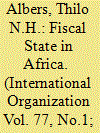

|
|
|
|
|
| Summary/Abstract |
What is the level of state capacity in developing countries today, and what have been its drivers over the past century? We construct a comprehensive new data set of tax and revenue collection for forty-six African polities from 1900 to 2015. Our data show that polities in Africa have been characterized by strong growth in fiscal capacity on average, but that substantial heterogeneity exists. The empirical analysis reveals that canonical state-building factors such as democratic institutions and interstate warfare have limited power to explain these divergent growth paths. On the other hand, accounting for the relationship between African polities and the international environment—through the availability of external finance and the legacy of colonialism—is key to understanding their differing investments in fiscal capacity. These insights add important nuances to established theories of state building. Not only can the availability of external finance deter investment in fiscal capacity, but it also moderates the efficacy of canonical state-building factors.
|
|
|
|
|
|
|
|
|
|
|
|
|
|
|
|
| 4 |
ID:
191911
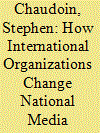

|
|
|
|
|
| Summary/Abstract |
How do international organizations change the discussion of human rights violations, and how does their message reach the broader public? I show that national media is a key conduit. I analyze media coverage from the Philippines to show that the content of media coverage of the “war on drugs” changed after a major decision by the International Criminal Court. The ICC increased the proportion of media coverage focusing on human rights by triggering contestation between pro- and anti-human-rights actors. Original survey experimental evidence shows that this coverage shift blunts the effect of ICC actions on support for the war on drugs. This highlights an indirect role for international organizations in shaping media coverage and helps explain why they have struggled to win public opinion battles. Though their actions amplify the voices of human rights supporters, media coverage concurrently amplifies the voices of their opponents, which can crowd out coverage that might otherwise have decreased support for problematic polices.
|
|
|
|
|
|
|
|
|
|
|
|
|
|
|
|
| 5 |
ID:
191910
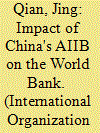

|
|
|
|
|
| Summary/Abstract |
The World Bank, under the stewardship of the United States, stands out as the global leader among international development organizations. Does China's establishment of the Asian Infrastructure Investment Bank (AIIB) undermine this status? Examining this question, we focus on the borrowing practices of a special set of countries: the founding members of the AIIB. These founders openly defied the public preference of the United States, arguably to create a potential rival to the World Bank. Using a new causal inference method, Pang, Liu, and Xu's Dynamic Multilevel Latent Factor Model—as well as several well-known estimation models as robustness checks—we document at least a temporary decrease in the number of World Bank infrastructure projects that the developing AIIB founders have entered into. This study presents the first systematic evidence that China's AIIB could unsettle the political influence the United States has enjoyed over developing countries through its leadership of the World Bank. An important set of countries may be parting ways with the World Bank and looking to a Chinese institution for leadership in the world of development.
|
|
|
|
|
|
|
|
|
|
|
|
|
|
|
|
| 6 |
ID:
191905


|
|
|
|
|
| Summary/Abstract |
What effect does state violence have on the cohesiveness and fragmentation of insurgent organizations? This article develops a theory of how state violence against civilians affects insurgent cohesion and fragmentation in civil war. It argues that the state-led collective targeting of an armed group's alleged civilian constituency increases the probability of insurgent fragmentation, defined as the process through which insurgent organizations split into distinct entities, each with its own social composition, goals, and leadership. This effect is driven by the interaction of several mechanisms at the individual, group, and organizational levels: state-led collective targeting enlarges the supply of fresh recruits, strengthens the bonds between immediate group members (interpersonal cohesion), and disrupts intra-organizational coordination, strategic unity, and institutional arrangements that underpin the commitment of individual fighters to the organization as a whole (ideological cohesion). The implications of this argument are empirically tested in an analysis of armed groups fighting against their governments between 1946 and 2008. The results suggest that campaigns of massive state violence directed against the civilian constituency of rebel groups increase the overall risk of insurgent fragmentation, a finding that has important implications for the duration and escalation of civil wars.
|
|
|
|
|
|
|
|
|
|
|
|
|
|
|
|
| 7 |
ID:
191908
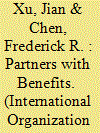

|
|
|
|
|
| Summary/Abstract |
Scholars often assume that courts in authoritarian regimes cannot credibly protect foreign investors’ interests because these institutions lack judicial independence. In this article, we construct a novel data set on multinational corporations’ litigation activities in Chinese courts from 2002 to 2017. This supports the first systematic case-level analysis of foreign firms’ lawsuit outcomes in an authoritarian judiciary. We find that foreign companies frequently engage in litigation in authoritarian courts. Moreover, we theoretically and empirically distinguish between two types of government–business ties in terms of their effectiveness in incentivizing the host state to protect foreign investors’ interests. We argue that ad hoc, personal political connections deliver only trivial lawsuit success for multinational enterprises, while formal corporate partnerships with regime insiders can lead the state to structurally internalize foreign investors’ interests. In particular, we demonstrate that joint venture partnerships with state-owned enterprises help foreign firms obtain more substantial monetary compensation than other types of multinational enterprises. By contrast, the personal political connections of foreign firms’ board members do not foster meaningful judicial favoritism. These findings are robust to tests of alternative implications, matching procedures, and subsample robustness checks. This article advances our understanding of multinational corporations’ political risk in host countries, government–business relations, and authoritarian judicial institutions.
|
|
|
|
|
|
|
|
|
|
|
|
|
|
|
|
| 8 |
ID:
191907
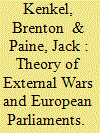

|
|
|
|
|
| Summary/Abstract |
The development of parliamentary constraints on the executive was critical in Western European political history. Previous scholarship identifies external wars as a key factor, but with varying effects. Sometimes, willing monarchs granted parliamentary rights in return for revenues to fight wars. Yet at other times, war threats empowered rulers over other elites or caused states to fragment. We analyze a formal model to understand how external wars can either stimulate or undermine prospects for a contractual relationship between a ruler and elite actors. We recover the standard intuition that war threats make the ruler more willing to grant parliamentary rights in return for revenue. Our key insight is that war threats also affect the bargaining position of elites. A previously unrecognized tension yields our new findings: stronger outsider threats increase pressure either on elites to fund the ruler or on the ruler to accept constraints—but not both simultaneously. Elites with immobile wealth depend on the ruler for security. War threats undercut their credibility to refuse funding for an unconstrained ruler. By contrast, war threats make elites with mobile wealth and a viable exit option unwilling to fund a hopeless war effort. Only under circumscribed conditions do war threats align three conditions needed for parliament to arise in equilibrium: ruler willingness, elite credibility, and elite willingness. We apply our theory to posit strategic foundations for waves and reversals of historical European parliaments.
|
|
|
|
|
|
|
|
|
|
|
|
|
|
|
|
|
|
|
|
|